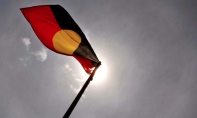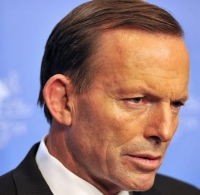- About Us
- Columns
- Letters
- Cartoons
- The Udder Limits
- Archives
- Ezy Reading Archive
- 2024 Cud Archives
- 2023 Cud Archives
- 2022 Cud Archives
- 2021 Cud Archives
- 2020 Cud Archives
- 2015-2019
- 2010-2014
- 2004-2009
 |
National Indigenous Television News Is Needed |
Little Good News On National Indigenous Television News
When the Coalition Government came to power in Australia in 2013, Prime Minister Abbott announced that he would take a special interest in Indigenous affairs. He made a good beginning by spending a week living in a remote Indigenous community. There is no doubt that a strong approach to Indigenous issues was and remains absolutely necessary for Australian governments. The indicators of Indigenous disadvantage are undisputed and severe in life expectancy, health issues such as diabetes and kidney and cardiovascular disease, education levels, unemployment, household income, incarceration and self-harm rates through smoking and drug and alcohol addictions. The ‘Close the Gap Progress and Priorities Report 2015’ * shows that while life expectancy for example, in the five year period to 2012 increased by 1.6 years for males and 0.6 of a year for females, the gap between Indigenous Australians and others remains about ten years.
In recent times, slow progress has been achieved in addressing these areas of disadvantage. We Australians are good at slogans, and have embraced the idea of ‘Closing the Gap’ between Indigenous people and the general population. Unfortunately, such slogans are reduced to the status of mere rhetoric when administrative decisions, and sometimes government policies fail to support the aim of ‘closing the Gap’. The Close the Gap campaign committee found it necessary to tell the government that its proposed amendments to the Racial Discrimination Act would hinder the campaign’s work and increase the disadvantage of Aboriginal and Torres Strait Islander peoples. Indigenous peoples suffer discrimination based on their colour, appearance and lifestyles.
The Government has proposed that a referendum be held to enable the Constitution to be altered to recognise the unique place held by Australia’s Indigenous peoples. Unfortunately, not all Indigenous people think that the kind of recognition proposed by the government will make any difference to their disadvantage. Having never ceded sovereignty for example, some Indigenous people believe that a treaty would be more appropriate. While all recognise the importance of identity issues for people whose have traditionally been tied to occupation of their lands, they are concerned that the government seems to have one idea only.
The case of those Indigenous people sceptical about the government’s motives is strengthened by some puzzling recent decisions. Support services have been denied funding during general cuts to the portfolio’s budget. Refuges and halfway houses have been denied funding. The literacy program headed by Olympic swimming champion Ian Thorpe and journalist Jeff McMullen has been forced to close (the program associated with Olympic gold medallist Cathy Freeman survives). The Aboriginal legal service in the most populous state, New South Wales, is having its budget slashed. It is difficult to see how the government can reconcile such cutbacks with its stated aims of closing gaps.
In a further decision, apparently taken in-house by the management of the Special Broadcasting Service, the National Indigenous TV news is being cut. Currently, NITV news bulletins run nightly on NITV, which is SBS Channel 4. The bulletin cannot cost much to produce, given that some news items draw directly on SBS general reporting staff. There is no doubt that NITV is valued. Indigenous people look to their own services a great deal for coverage they can trust. The items are generally very well balanced and sensibly reported, and selected for their Indigenous interest. Other news broadcasts do not do this. While management suggests that there will be some Indigenous reports in general bulletins, it is doubtful that viewers would sit through an hour’s bulletin just in case an item of interest to them appeared. A Prime Minister genuinely interested in Aboriginal advancement should intervene to stop the loss of this important service. Loss of the news bulletin could well be the beginning of the channel’s demise and that would be tragic. Aboriginal languages, vital for identity and maintenance of culture, are under threat and NITV is the one television channel on which language is heard.
 The premier of Western Australia is, like the prime minister, a ‘Liberal’. He has come under attack recently for seeking to close some remote Aboriginal communities in his vast state. He has cited the difficulty of adequately servicing such communities and has referred specifically to the possibility that children are being abused. This argument, pushed strongly by News Corporation, was used to justify the so-called ‘intervention’ in the Northern Territory during the late years of the Howard Government. Social welfare payments were quarantined and purchases limited in ways that would be unacceptable to non-Indigenous people. Critics of the WA government’s plans suggest that Aboriginal people hold up developments, particularly mining, because of sensitivity over sacred sites.
The premier of Western Australia is, like the prime minister, a ‘Liberal’. He has come under attack recently for seeking to close some remote Aboriginal communities in his vast state. He has cited the difficulty of adequately servicing such communities and has referred specifically to the possibility that children are being abused. This argument, pushed strongly by News Corporation, was used to justify the so-called ‘intervention’ in the Northern Territory during the late years of the Howard Government. Social welfare payments were quarantined and purchases limited in ways that would be unacceptable to non-Indigenous people. Critics of the WA government’s plans suggest that Aboriginal people hold up developments, particularly mining, because of sensitivity over sacred sites.
The ‘Close the Gap’ committee is well aware that the federal system creates difficulties for the campaign to deliver appropriate strategies. When the WA premier declared that the action was necessary because of federal funding cuts, the prime minister suggested that government cannot support ‘lifestyle’ choices. This comment attracted widespread condemnation. Indigenous people expressed outrage that this supposedly sensitive and empathetic politician would compare Aboriginal living modes with lifestyle choices made by his more affluent constituents. The WA premier defended Abbott as someone who is familiar with Indigenous circumstances and cares about Indigenous people. To make such an appalling statement about Indigenous connections with their land however, is bound to encourage those people who are hostile to Aboriginal culture. United Nations conventions accept that Aboriginal culture is intrinsically tied to land and that cultural values play an essential role in Aboriginal identity. And conventions commit the Australian government to support Indigenous cultures and cultural activities. Loss of identity is a root cause of Aboriginal disadvantage.
Mr Abbott’s predecessor as Prime Minister suffered the ignominious fate of having Indigenous people turn their backs on him when he addressed a conference. Mr Abbott has sought to form a better relationship with Aboriginal and Torres Strait islanders. Paradoxically, declarations about caring mean little in the context of so many appalling actions towards Indigenous peoples.
*The Close the Gap Progress and Priorities Report 2015 is available at the website of the Human Rights Commission.
A former academic, Tony Smith has written extensively on a wide range of subjects as diverse as folk music and foreign policy issues in the Australian Review of Public Affairs, the Journal of Australian Studies Review of Books, Overland, the Australian Quarterly, Eureka Street, Online Opinion and Unleashed.
